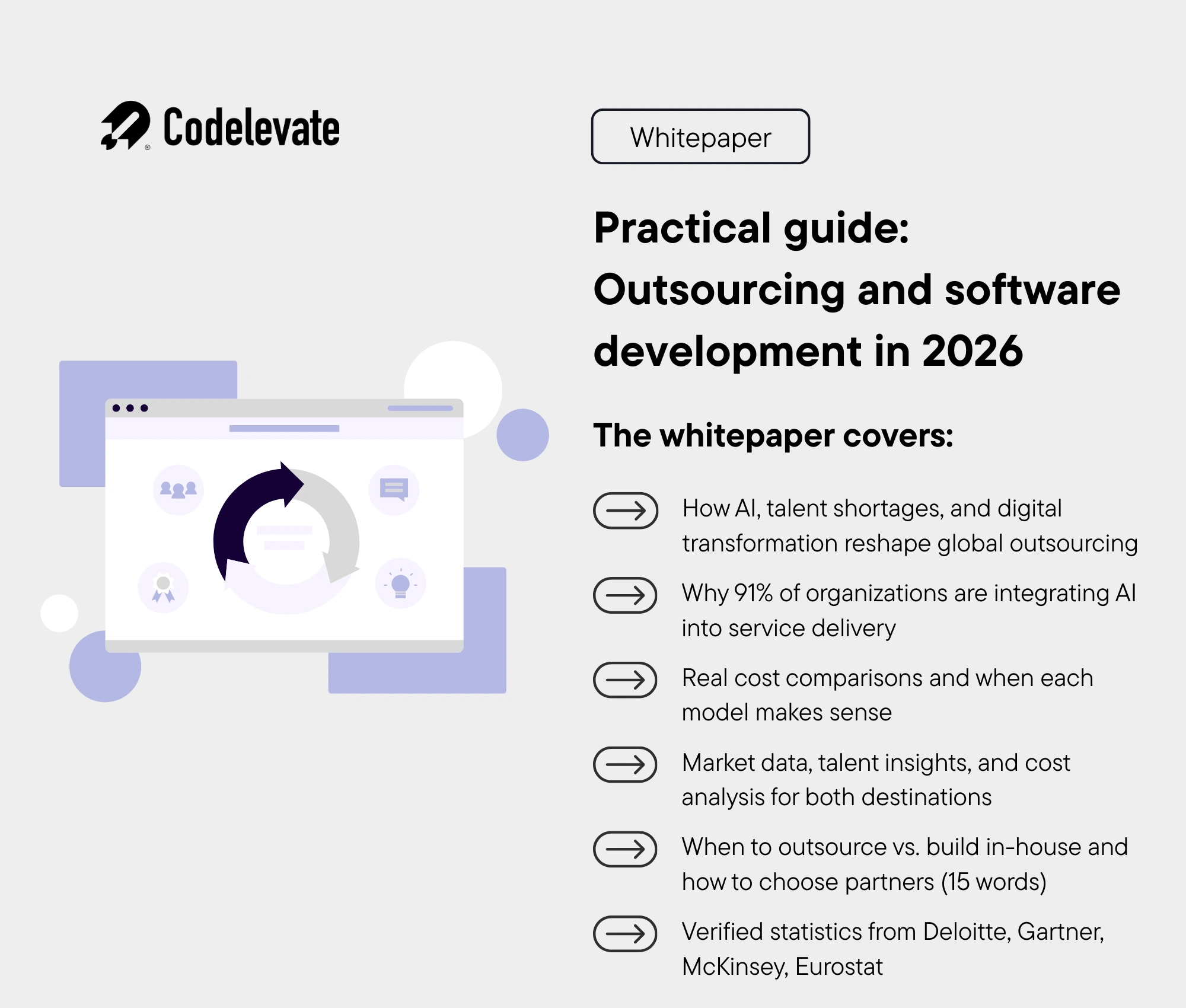IT outsourcing in the Netherlands: Practical cost-saving tips
IT outsourcing in the Netherlands stands out as a smart solution for companies looking to access advanced technology, scalable teams, and top-notch skills. With a strong digital infrastructure, a transparent regulatory environment, and a vibrant tech talent pool, the Netherlands attracts many businesses across Europe and beyond. Whether your company wants to accelerate a digital transformation, enhance cybersecurity, or simply optimize software development costs, smart outsourcing strategies will make a real difference in your bottom line.
This guide uncovers practical cost-saving tips, essential insights, and trusted tools you can use to create maximum value through IT outsourcing in the Netherlands – explained in simple, straightforward language.
What makes the Netherlands a top IT outsourcing destination?
The Netherlands offers an unbeatable combination of high-quality tech talent, innovation-friendly policies, and strong connections to the rest of Europe. Known for its open-minded approach to technology and business, the country has become one of the go-to destinations for businesses seeking reliable IT outsourcing partners. According to Statista, the Dutch IT services market is poised to hit over $28 billion by 2025, with continuous growth expected. This growth has been fueled by the Netherlands’ strong emphasis on digital infrastructure, data protection laws, and a growing ecosystem of skilled professionals.
The country’s strategic location within Europe allows companies to easily access other key markets, making it an ideal hub for international business. Moreover, the Netherlands consistently ranks high for its work-life balance and quality of life, making it a highly attractive destination for skilled workers from around the globe.
The growth of the Dutch tech talent pool continues to provide businesses with access to highly skilled IT professionals who are proficient in cutting-edge technologies like artificial intelligence (AI), machine learning, cloud computing, and cybersecurity.
Top benefits of outsourcing IT in the Netherlands
Outsourcing IT in the Netherlands offers many advantages that can help companies scale their operations effectively while reducing costs. Some of the top benefits include:
- Access to exceptional technical skills and English-speaking professionals
The Netherlands is home to a highly educated and skilled workforce, particularly in the fields of software development, AI, and data science. With many Dutch professionals fluent in English, it is easy for international businesses to communicate and collaborate with teams in the Netherlands without any language barriers.
- Reliable digital infrastructure and a rich innovation ecosystem
The Netherlands has one of the most reliable and efficient digital infrastructures in the world. This infrastructure supports high-speed internet, secure data centers, and state-of-the-art technology platforms. Moreover, the country’s tech ecosystem is dynamic, with a culture of constant innovation, ensuring that businesses can leverage the latest tools and technologies.
- A business-friendly environment marked by transparency and accountability
Dutch businesses operate in a highly transparent regulatory environment, where companies are expected to maintain clear and honest communication with clients. This level of transparency builds trust and allows businesses to effectively manage their outsourcing partnerships, reducing the risk of misunderstandings or hidden costs.
- Close time zone alignment and a culture known for direct, clear business communication
The Netherlands shares similar working hours with many European countries, making it easier for businesses to manage cross-border projects. The Dutch work culture is known for its straightforwardness and clarity, which fosters direct communication and minimizes the risk of delays caused by misunderstandings.
Understanding cost drivers in Dutch IT outsourcing
Before exploring cost-saving tips, it’s important to understand the factors that typically determine costs when outsourcing IT in the Netherlands. These factors include:
- Salaries for local IT talent: The Netherlands offers some of the highest salaries for IT professionals in Europe. The high demand for tech talent combined with the high cost of living drives up salary rates.
- Specializations: Certain tech specializations, such as cybersecurity, AI, and data science, command premium rates due to their complexity and the level of expertise required. For instance, senior software architects and AI engineers are often among the highest-paid professionals in the industry.
- Project complexity and technology stack: More complex projects, such as developing cutting-edge AI solutions or integrating multiple systems, require higher levels of expertise and can increase costs. The choice of technology stack also impacts pricing, as some technologies require more advanced skills or specialized tools.
- Compliance regulations: The Netherlands’ strict data privacy laws, particularly the General Data Protection Regulation (GDPR), require businesses to work with outsourcing partners who have robust security and compliance practices. Ensuring adherence to these regulations can incur additional costs, especially for sensitive projects.
Despite these higher costs, companies justify the investment by the quality, speed, and security that come with outsourcing to Dutch firms. However, by leveraging certain strategies, businesses can still reduce their total spend while benefiting from the expertise available in the Netherlands.
Cost-saving tips for IT outsourcing in the Netherlands
Achieving cost efficiency in Dutch IT outsourcing requires careful planning and strategic decision-making. Here are some cost-saving tips to help you optimize your outsourcing strategy:
- Staff augmentation: This model involves temporarily adding vetted Dutch IT professionals to your in-house team, scaling up or down as needed. It’s ideal for projects with a fixed duration or specific niche expertise requirements.
- Managed services: In this model, you outsource recurring tasks or specific operations like cybersecurity, infrastructure support, or helpdesk services to a third party. This allows your core team to focus on high-priority activities while reducing operational costs.
- Full outsourcing: Entrusting complete projects (development, support, or maintenance) to an external team can significantly reduce the need for local hiring. By leveraging economies of scale and accessing specialized expertise, companies can achieve substantial cost savings.
How to choose the right delivery model (step-by-step)?
1. Combine local and nearshore talent
To get the best from Dutch project management and technical rigor, while keeping costs competitive, many companies blend Dutch expertise with nearshore or remote teams. For example, a Dutch-based project leader may manage an international team located in Eastern Europe or the Mediterranean. Platforms like Deel and Remote make global hiring and payroll smooth, compliant, and cost-effective.
2. Compare and benchmark rates
3. Negotiate for long-term value
Most Dutch providers reward long-term relationships with volume discounts or flexible rate cards. Longer contract commitments often result in lower hourly prices and extra perks, such as dedicated support or free upgrades. Don’t be shy to negotiate—Dutch business culture appreciates honesty and directness.
4. Clarify ownership and intellectual property
Unexpected legal or IP ownership issues can create big, costly headaches down the road. Before kicking off any partnership, clarify who holds copyright to code, data, or other intellectual property produced. The Dutch Chamber of Commerce provides useful sample contracts and checklists, helping you keep legal and IP risks to a minimum.
5. Set clearly defined SLAs and KPIs
Service level agreements (SLAs) and key performance indicators (KPIs) should be crystal clear from day one. They’re the best way to avoid paying for missed deadlines, rework, or subpar deliverables. Consider using contract management tools like Contractbook to streamline documentation, automate renewals, and track milestones.
6. Use open source and cloud tools
Dutch IT experts love open-source tools and public cloud platforms. Leveraging solutions like GitHub, GitLab, or AWS for version control, DevOps, or hosting saves licensing fees and increases transparency. Cloud cost management services, such as CloudZero, can help identify waste and optimize your software spending.
7. Leverage government and startup subsidies
The Dutch government supports innovation and digitalization. Companies—especially startups and SMEs—can apply for funding and subsidies through programs like NL Innovation and the Netherlands Enterprise Agency. These can subsidize R&D, development, and pilot projects.
8. Harness local startup and developer communities
9. Optimize data privacy and compliance workflows
GDPR and data residency laws can drive up costs if not managed well. Automating compliance with tools such as OneTrust or Vanta can reduce manual work and the risk of costly penalties.
10. Start small, then scale
Piloting with a small scope project lets you test providers and workflow fit without a major upfront commitment. If all goes well, scale up—negotiating improved pricing as you expand.
Case example: Cost optimization in practice
Let’s say you’re a fintech startup in Amsterdam needing to build a new customer portal. Instead of hiring a large local software agency, you:
1. Form a hybrid team: a Dutch scrum master with Eastern European developers (using Deel for contracts and payments)
2. Rely on open source frameworks and public cloud for hosting and deployment
3. Negotiate a six-month managed services deal, with detailed SLAs
4. Apply for a Dutch digital innovation grant to subsidize part of your R&D costs
5. Regularly review progress and cost data within a contract management tool
The result? You gain Dutch-quality project oversight while keeping your average hourly rate far below the market peak.
.webp)
Ways to optimize your outsourcing process
Optimizing your IT outsourcing process is crucial to ensuring that you not only save costs but also maintain the quality and efficiency of your projects. Here are key strategies that can make a significant difference:
1. Be clear and detailed with your requirements and project scope upfront
One of the most important aspects of managing an outsourcing project effectively is to establish a clear and detailed project scope right from the beginning. This includes defining the exact deliverables, timelines, and expected outcomes. Good documentation plays a pivotal role in preventing scope creep—when the project’s scope gradually expands beyond the original parameters without adjusting timelines or costs. Scope creep is one of the major cost drivers in outsourcing projects, and without proper planning, it can lead to misaligned expectations, increased costs, and project delays. Be specific about what you expect in terms of project milestones, quality standards, and deadlines. A well-documented scope allows both you and your outsourcing provider to stay on the same page throughout the project, minimizing misunderstandings and surprises.
2. Choose partners open to regular, transparent reporting
A partnership built on transparency and clear communication will significantly improve the outcome of your outsourcing project. Set up regular progress reports, status meetings, and use project management tools like Trello, Asana, or Jira.
3. Build in flexibility for scaling your team as your business needs evolve
Flexibility is key when working with outsourced teams, as business priorities and needs can change rapidly. One way to maintain flexibility is by negotiating shorter contract cycles or rolling monthly agreements instead of locking into long-term contracts. This allows you to scale your outsourced team up or down as the project or business requirements evolve. For example, if your company faces a sudden surge in demand or needs to complete a new phase of the project quickly, you’ll be able to ramp up your outsourcing capacity without delays. Similarly, if business priorities shift and you no longer need certain resources, you can reduce your team size without being locked into an expensive contract. This approach provides you with the agility needed to stay competitive in a fast-paced business environment.
4. Find trusted IT outsourcing partners
When it’s time to select a Dutch IT outsourcing provider, there are several key factors to consider to ensure that you’re working with a trusted, reliable partner who aligns with your business needs and goals. Here's how to proceed:Many companies start by working with smaller teams or contractors through platforms like Upwork or Toptal before scaling up to larger, more permanent outsourcing engagements. This provides a low-risk way to test the provider’s capabilities and establish a working relationship before committing to a larger, long-term contract.
5. Check the provider’s track record with clients in your sector
Look for IT outsourcing companies that have experience working with businesses in your industry. Verified reviews on platforms like Clutch or LinkedIn can provide insights into the provider’s reliability and past performance.
6. Ensure technical and cultural fit by setting up an intro call with project leads
It’s important to assess whether your potential outsourcing partner not only has the technical skills you need but also shares a compatible work culture. Rather than only speaking with sales staff, arrange an introductory call with the project leads or technical team who will be handling your work. This gives you a better sense of their communication style, problem-solving abilities, and work ethic.
7. Confirm the provider has certifications relevant to your project
Make sure the provider is properly certified, especially for projects that require high levels of security, privacy, or data compliance. Certifications like ISO/IEC 27001 for security, GDPR compliance, and other industry-specific certifications are essential to ensuring that your outsourcing partner meets regulatory standards.
8. Ask for case studies, especially for projects completed under time and budget constraints
Request case studies or detailed examples of similar projects the provider has completed in the past, especially those where time and budget constraints were present. This demonstrates the provider's ability to handle projects efficiently and deliver quality outcomes within the agreed-upon parameters
Useful tools and resources for outsourcing in the Netherlands
To make your IT outsourcing process smoother, there are a variety of tools and platforms available to streamline the hiring, management, and compliance aspects of outsourcing. These resources can significantly reduce overhead while improving efficiency and ensuring compliance with legal requirements:
1. Deel (for global hiring and payroll)
Deel allows businesses to hire remote talent globally and manage payroll, taxes, and benefits in compliance with local laws.
2. Remote (to manage international compliance)
Remote simplifies global hiring and ensures compliance with local labor laws, particularly for businesses working with teams in different countries.
3. Glassdoor or PayScale (to benchmark IT salaries)
These platforms provide up-to-date salary insights, allowing businesses to benchmark IT salaries and ensure they’re paying competitive rates for talent. For example, the average salary for an IT Specialist in Amsterdam is €4,000 per month, with a range between €3,000 and €5,000.
4. Contractbook (to create and manage legal documents)
Contractbook helps businesses manage contracts with their outsourcing partners by automating contract creation, tracking renewals, and simplifying legal processes.
5. CloudZero (cloud spend analysis)
CloudZero helps optimize cloud spending by analyzing usage patterns and identifying areas where costs can be reduced or optimized.
6. OneTrust or Vanta (data compliance automation)
These tools automate data compliance tasks, ensuring that businesses adhere to data privacy regulations like GDPR without having to manage them manually.
7. GitHub or GitLab (open-source collaboration)
Both platforms enable collaborative development using open-source tools, promoting code transparency and reducing licensing costs.
8. Meetup (to join Dutch tech community events)
Meetup is a great resource for connecting with the Dutch tech community, finding networking events, and collaborating with local developers.
9. Netherlands Enterprise Agency (grant information)
This government agency provides grants and financial support for businesses involved in digital innovation, including IT outsourcing projects.
10. Clutch (IT provider reviews)
Clutch is a well-established platform for reading verified client reviews of IT service providers, helping businesses make informed decisions.
Each of these tools and platforms helps optimize your outsourcing process, reduce overhead, and access valuable market intelligence without complicating your workflow.
Important legal tips for outsourcing in the Netherlands
When outsourcing IT to the Netherlands, there are a few essential legal considerations that can help you avoid unnecessary risks and costs:
- Always check if your provider is formally registered with the Dutch Chamber of Commerce
This ensures that your outsourcing partner is a legitimate business entity with a legal presence in the Netherlands, which can help avoid potential legal issues down the line. - Build GDPR compliance checks into your onboarding and project initiation process
Since the Netherlands is subject to the European Union's General Data Protection Regulation (GDPR), make sure your outsourcing provider adheres to these standards. Implementing GDPR compliance measures early in the process will prevent costly fines or legal challenges. - Review contract renewal, exit clauses, and IP transfer terms
Before signing a contract, ensure that the terms regarding contract renewals, exit clauses, and intellectual property (IP) transfer are clearly defined. This prevents future misunderstandings and hidden costs when the agreement is concluded or terminated. - Make sure you and your provider are aligned on data storage locations and audit rights
Given the sensitivity of data storage and handling, confirm that both you and your provider are on the same page about where the data will be stored and whether you have the right to audit the provider’s operations.
Common mistakes to avoid
To ensure a successful IT outsourcing partnership, avoid these common mistakes:
- Skipping due diligence: Take the time to interview potential outsourcing partners, check their references, and validate their claims to ensure they are trustworthy and capable.
- Focusing only on upfront rates: While initial rates are important, it's equally crucial to consider the total cost of ownership, including hidden fees, ongoing management costs, and long-term scalability.
- Underestimating Dutch labor and compliance costs: Dutch labor costs and compliance requirements are higher than in many other countries, but the benefits of high-quality work and legal protections often outweigh these costs.
- Not piloting with a small project first: Testing with a small project or deliverable allows you to build trust with your outsourcing partner incrementally, reducing the risks of a large-scale rollout.
- Leaving KPIs and SLAs vague: Clear and specific key performance indicators (KPIs) and service level agreements (SLAs) are essential to avoid uncontrolled costs or disputes during the project.
How to get started
To kick off your IT outsourcing project successfully, follow these steps:
- Identify the skills or services you actually need: Determine whether you need mobile development, cybersecurity, DevOps, or any other specialized skill for your project.
- Set a clear budget and target outcomes: Create a detailed budget that accounts for all hidden costs such as onboarding, training, and compliance work.
- Use salary and rate comparison tools: Leverage platforms like Glassdoor and PayScale to get an accurate understanding of market rates before negotiating.
- Shortlist flexible partners: Select outsourcing providers who are comfortable scaling up or down depending on the needs of your business.
- Start with a detailed project scope: Ensure transparency from day one by setting clear expectations, deliverables, and timelines.
Outsourcing trends shaping 2025 and beyond
As technology continues to evolve, IT outsourcing is increasingly influenced by new trends that are reshaping how businesses approach global talent and cost optimization:
- Adoption of AI-powered automation: More routine IT tasks, such as code reviews and security testing, are being automated, reducing labor costs and increasing efficiency.
- Hybrid and remote-work-ready teams: The shift toward hybrid and remote teams has reduced office-related costs and fostered greater collaboration across borders.
- Automated hiring, compliance, and payments: Platforms that streamline these processes are growing in popularity, further reducing admin time and legal risks for outsourcing businesses.
- Sustainable outsourcing: Dutch providers are investing in eco-friendly infrastructure and green energy data centers, which may result in long-term savings for clients concerned about their environmental impact.
By leveraging these trends, companies can enhance the cost-effectiveness and sustainability of their IT outsourcing efforts in the Netherlands.
Top 5 IT outsourcing companies in the Netherlands
In the Netherlands, outsourcing has become a fundamental strategy for businesses looking to optimize costs while ensuring high-quality services. Here are five notable outsourcing companies that stand out due to their technical expertise, innovation, and commitment to delivering exceptional value to their clients.
1. Codelevate – A product & AI partner for SaaS
Codelevate is a full-stack product and AI partner that assists SaaS companies in transforming their ideas into reality. With a focus on AI-driven features and custom platforms, Codelevate provides a clear, transparent development process with fixed pricing. The company excels in delivering reliable AI products designed to solve real-world problems, not just for show. Their team, based in Amsterdam, works closely with clients to ensure clarity and predictability in costs and timelines. Codelevate’s services include product discovery, backend and frontend software development, and AI integration for SaaS companies.
2. ML6 – Advanced AI engineering at scale
ML6 is a leading AI studio known for developing robust machine learning systems and end-to-end AI pipelines. They focus on turning complex AI research into scalable, production-ready solutions. As partners with Google Cloud and OpenAI, they offer deep technical expertise in deploying AI solutions across various industries such as healthcare, manufacturing, and e-commerce. ML6 is particularly skilled at handling enterprise-level AI projects, ensuring scalability and performance across platforms.
3. Global Orange – Full-cycle software & AI solutions
Global Orange Netherlands is a leading technology partner delivering end-to-end services in software development and AI solutions. With a skilled team of professionals across multiple locations, they manage projects from initial design through post-launch support. Global Orange Netherlands is recognized for handling large-scale, complex initiatives across various industries, offering flexible engagement models and reliable delivery at enterprise scale. Their expertise spans custom software development, AI and machine learning applications, and cloud-based solutions, making them an ideal partner for companies aiming to innovate, scale, and optimize their digital operations.
4. Amsterdam Standard – Tech partner for scaling responsibly
Amsterdam Standard specializes in helping tech companies scale efficiently and sustainably. The company focuses on reducing technical debt and improving product quality through clean architecture and long-term maintainability. Amsterdam Standard supports startups and scaleups by offering team extension and hybrid delivery models, where their developers integrate seamlessly with in-house teams. The company’s services include software development, QA & testing, DevOps, and UI/UX design, making them a valuable partner for businesses looking to grow without compromising on quality.
5. Brthrs – Ethical, Custom AI & Digital Automation
Brthrs is a boutique digital partner that builds AI tools and automations with a strong ethical foundation. Their team focuses on creating technology that works for people, emphasizing transparency, privacy, and inclusivity. They specialize in AI automation, no-code solutions, and digital strategy, working closely with clients to ensure that every project aligns with long-term values. Brthrs’ focus on ethical design and human-first technology makes them a standout choice for organizations that want their digital tools to reflect ethical principles and deliver sustainable, inclusive solutions.
These outsourcing companies are making a significant impact in the tech and AI space, helping businesses reduce costs while driving innovation. Their expertise in scalable solutions, AI integration, and transparent processes ensures that organizations can achieve their goals with efficiency and reliability.
Conclusion
IT outsourcing in the Netherlands is a powerful way to tap into top-quality tech talent, robust infrastructure, and a reliable business culture. Higher costs are a reality, but with the right strategies, tools, and partnerships, your company can enjoy all the advantages of Dutch IT without overspending. To recap, use a mix of hybrid teams, leverage nearshore or remote talent when needed, negotiate long-term contracts for discounts, and harness community, open source, and government support to boost your ROI. Always prioritize clarity and transparency, in contracts, deliverables, and communications, and regularly review KPIs to ensure you’re on track. With these proven cost-saving tips, IT outsourcing in the Netherlands can help your business move faster, stay innovative, and remain cost-competitive, whatever your market or ambitions.
Want to make smarter outsourcing decisions? Get our free whitepaper with just one click and dive deeper into global outsourcing!


Why Codelevate is your best outsourcing partner
At Codelevate, we’re all about working closely with our clients to create high-quality, scalable solutions that match your business goals and timelines. We keep things simple with a fixed pricing model, so there are no surprise costs or scope creep along the way. With over 120 clients under our belt, we’ve got the experience to manage projects of all sizes. We’re also committed to data privacy and sustainable practices, so you can trust that your project is in good hands. Whether you're a startup or an established enterprise, our team’s expertise in SaaS and AI is always here to help you succeed.



.webp)


.svg)




